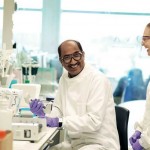 One of the more pleasing aspects of the sharing economy has been the growing number of collaborations between big companies and the grassroots hobbyists that often surround them.
One of the more pleasing aspects of the sharing economy has been the growing number of collaborations between big companies and the grassroots hobbyists that often surround them.
For instance, TechShop have long standing partnerships with the likes of Ford and GE that allow employees from both companies to rub shoulders and collaborate with outside stakeholders at the TechShop facilities.
I’ve written previously about the growth in sharing lab space in the biotech industry, with projects such as Genspace and Science Exchange providing researchers with superbly equipped lab spaces to use.
Such efforts aren’t confined to grassroots projects. GlaxoSmithKline launched its first Open Lab in Madrid back in 2010. In the four years since then, the Tres Cantos facility has emerged as a thriving hub for research into diseases effecting the developing world.
Such has been the success of the project, the company have opened a second Open Lab in Africa to specialize in non-communicable diseases.
The Open Lab concept was formed upon the realization that many of the challenges facing the research community are too great for single entities to solve on their own. The idea is that external researchers can go and work alongside GSK scientists on their own projects.
The project is touted as one with no strings attached whereby scientists can collaborate freely, share data and generally look to spread knowledge far and wide.It’s probably too soon to really judge the success of the lab in terms of new products, but hopefully one thing it can help with is the cultural shift that is required in pharma.
GSK hope to apply the lessons from the first Open Lab to make the second one even better at kick starting research in Africa.
The project has been backed to the tune of £25 million over five years, and the aim is to sit at the center of a research network that will focus on the causes, presentation, and progression of disease in this setting, and to inform prevention and treatment strategies of NCDs in African patients.
Of course, this isn’t the first venture into greater openness by the company. They are anchor tenants at the Stevenage Bioscience Catalyst in the UK, which is a science park that aims to promote connections and open science between its various tenants.
Suffice to say, the investment in Open Labs by GSK is tiny in relation to their overall R&D spending each year, so it would not be right to trumpet a widespread change in approach by the company, but it is hopefully a sign of a slightly more open approach to research by them.
The fact that they've invested such a small sum probably tells you all you need to know here.
£5 million a year? Hardly worth bothering with is it?
I hear what you say Nick, but we always say that its best to fail in small ways, so hopefully GSK will scale things up a lot should it prove to be successful.
That's true, fair point.